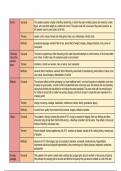Eat me Synopsis The speaker explores a highly controlling relationship, in which they seem entirely passive and owned by a male
figure, who uses their weight as a method of control. The poem ends with a reversal of the power dynamics, as
the speaker uses his own actions to kill him.
Themes weight, control, abuse, female and male gender roles, sex, relationships, identity, body
Methods possessive language, semantic field of sex, lexical field of weight, imagery, dialogue structure, irony, sense of
compulsion
Chainsaw Synopsis The poem is polysemous, either focussing on the male chauvinist attempts to control women, or the human battle
versus the over nature. In either case, the repressive party is unsuccessful.
pampas
grass Themes machismo, control over women, man vs nature, toxic masculinity
Methods semantic field of machismo, semantic field of femininity, lexical field of manufacturing, lexical fields of nature, tone,
very casual, sexual imagery, dramatisation of conflict
Material Synopsis The persona reflects on their upbringing in a more traditional world - one less focussed on materialism, and more
focussed on good quality - a world in which handkerchiefs were commonly used. She laments her own parenting,
saying that she feels she has failed for not holding the same standards. The poem ends with her reminiscing on
her mother’s advice that no matter how society changes, she has to choose to create the same experience in a
changing world
Themes change, mourning, nostalgia, materialism, motherhood, identity, family, generations/ legacy
Methods mournful tone, spotty rhyme scheme that worsens, imagery, reflective narrative
History Synopsis The speaker is trying to process the events of 9/11, trying to process the tragedy, their own feelings and fears
while also trying to help their child find life and joy - while they scramble to do the same. They reflect on the acute
feeling of loss they will always carry.
Themes Human disaster, human togetherness, life, 9/11, reactions to disaster, sanctity of life, making history, meaning out
of disaster
Methods allusions to 9/11, kite imagery, lack of punctuation, liberation, vulnerable, emotional tone, fragmentation
(represents cultural and physical fragmentation), kites connecting us to higher purpose, metaphors/ symbolism,
juxtaposition
An easy Synopsis This speaker in the poem is clearly older, watching two younger girls, about to embark on the journey of puberty.
passage She portrays the younger girls to be naive and blind to the journey they are about to embark on, and of the real
, world, as they are wholly focussed on each other.
Themes puberty, naivety, childhood vs adulthood, change
Methods enjambment, colloquial tone, the persona, tone
The Synopsis The poet discusses the issue of femicide in India, and the hard life that the children face. There is large satirical
Deliverer criticism of the white saviour complex as the American families are so unaware of how challenging life has already
been for these children.
Themes femicide, white saviour complex, social criticism, gender roles
Methods locational deixis, semantic and lexical fields of femicide and gendered anatomy, satire, descriptive language
The Synopsis This is a poem heavily influenced by folklore about a Lammas Hireling on a farm who turns out to be a ‘warlock’. It
Lammas explores violence, nature, and witchcraft. It encourages the reader to consider how guilt and fear can change a
hireling person’s priorities. In the poem, the persona hires a farmhand on the day of Lammas - a pagan harvest festival.
The ‘hireling’ turns out to be a warlock - a hare (a pagan symbol of abundance, prosperity and good fortune), and
when the persona catches him performing some kind of ritual, they kill him, despite knowing that crossing the hare
will have severe consequences. There is a description of metamorphosis and a distinct sense of magic, and the
poem ends with the persona fearing for their safety (making bullets) and consistently repenting.
Themes magic, paganism, Catholicism, morality, sexuality, sanity, guilt and innocence
Methods dramatic monologue, diction and language choice, the use of binaries, Enjambment
To my Synopsis The speaker is an older version of the younger persona, apologising for how she has aged and squandered their
nine-year-ol shared dreams. She has lost the romanticised, bright and lively worldview that she once had, but still cherishes it,
d self and is unwilling to ruin this for the girl, so chooses to let her continue living in blissful ignorance.
Themes naivety, innocence and blissful ignorance, ageing
Methods bifurcation, imagery, tone, persona, tone
A minor role Synopsis A dual meaning - either about someone’s experience with chronic illness, and being forced to act and pretend for
the sake of society, while they are forced into the shadows they grow to love - or about a nurse, who is overlooked
by society.
Themes illness, acting, life, social expectations
Methods allusion to the chorus from Oedipus Rex, colloquial tone, versification, semantic field of acting




